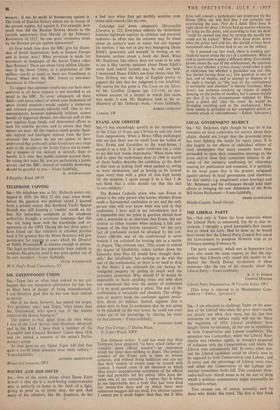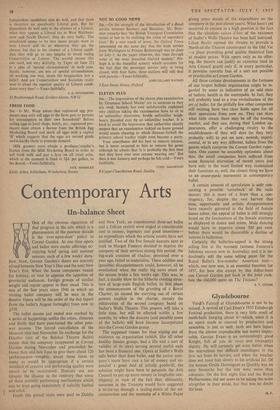SIR,—I am reluctant to challenge Taper on the ques- tion
of the Liberal vote when the poor chap's maths are clearly not what they were, but his last two comments on the subject really will not do. Since the beginning of 1954, Liberal candidates have fought eleven by-elections, all but one in opposition to both Conservative and Labour candidates. The exception was Carmarthen, where the Liberal Asso- ciation was (whether rightly or wrongly) suspected of collusion with the Conservatives, and where the Liberal vote consequently fell. In every other con- test the Liberal candidate could be clearly seen to be opposed to both Conservatives and Labour, and , in every case the percentage of Liberal votes rose, and either the Conservative or the Labour per- centage (sometimes both) fell. This consistent three- and-a-half-year record seems to be the sort of thing which a political commentator might reasonably be expected to notice.
Two excuses are, of course, normally used by those who dislike this trend. The first is that freak Independent candidates also do well, and that there is therefore no specifically Liberal gain. But In- dependents do well only in the absence of a Liberal; when they oppose a Liberal (as in West Waltham- stow and North Dorset), they do very badly. The conclusion seems to be that many people want to vote Liberal and do so whenever they get the chance, but that in the absence of a Liberal candi- date they will go to any lengths to avoid voting Conservative or Labour. The second excuse (the one used, not very skilfully, by Taper on June 21) is a plea of 'special circumstances' in each case. Surely, however, ten sets of special circumstances, all working one way, strain the imagination just a little? And are Conservatives and Socialists really wise to plead the superior quality of Liberal candi- dates every time?—Yours faithfully,















































 Previous page
Previous page